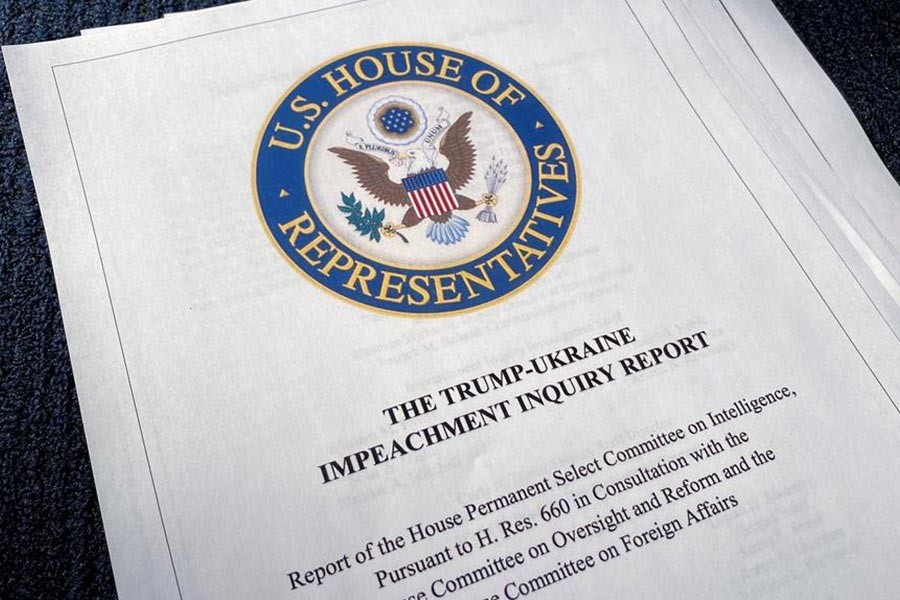When I decided to become a US citizen in 1990s, it was a deliberate decision to spend my life fighting for preserving and deepening democratic freedoms at a place where I have spent all my adult life. Having struggled against a brutal military dictatorship while I was a teenager, I knew that democracy is something you have to fight hard for. Therefore, when I became a citizen, for the swearing in event I took with me key documents of US democratic heritage. These included the constitution, the federalist papers and related documents from the 1780s. Since that ceremony I have tried to learn as much as I could about the crucial idea of democratic checks and balances among the executive, legislative and judiciary branches of our government. I have come to realise how prescient some of the revolutionaries from the 1770s and 1780s were in identifying the potential sources of tyranny and corruption of democracy. I have always looked at the impeachment provisions in this light.
As we know, George Mason, the author of Virginia's Declaration of Rights, over the course of the constitutional convention, realised the threat to democracy from the powerful executive branch of the new government he and his fellow revolutionaries were creating. Mason rightly concluded that the president of the republic could become a tyrant as oppressive as any absolute monarch. We also know that this line of thinking led to Mason's intervention in the debates on September 08, 1787, when he asked why were treason and bribery the only grounds in the draft Constitution for impeaching the president? His fear was that treason would not include "attempts to subvert the Constitution."And he was right.
It was his fellow revolutionary from Virginia, James Madison who helped Mason to develop a separate class of impeachable offences. This was what by now should be familiar to us from the House Judiciary Committee hearings- "other high crimes and misdemeanours." It was clear also from the seeming lack of understanding of the Republican house members why this phrase has been so contentious. It also underlined how the inclusion and interpretation can offer people fighting against tyranny of a dangerous executive power as the one at present some crucial assistance.
We have to thank the foresight and insight of three Virginians-Mason, Madison and delegate Edmund Randolph for this inclusion. These three men had very different positions on the Constitution; but their arguments in the debates in Philadelphia and at Virginia's ratifying convention in Richmond produced crucial definitions of an impeachable offence. Ultimately, the delegates agreed that a president could and should be impeached for abuses of power that subvert the Constitution, the integrity of government, or the rule of law.
These three Virginians-Mason, Madison, and Randolph- all defended vigorously the rights of the legislative branch to carry on procedures of impeachment if the evidence pointed towards abuses of power that subvert the Constitution, the integrity of government, or the rule of law. Thus on July 20, they opposed the arguments of Charles Pinckney of South Carolina and Gouverneur Morris of Pennsylvania who had moved to strike the impeachment clause. The arguments of Charles Pinckney of South Carolina and Gouverneur Morris of Pennsylvania were remarkably similar to what many Republican members of the House said during the debate on Decmber 18, 2019. In 1787 Morris had argued: "[If the president] should be re-elected, that will be sufficient proof of his innocence,". "[Impeachment] will render the Executive dependent on those who are to impeach." Mason's response was forthright: "Shall any man be above justice? Shall that man be above it who can commit the most extensive injustice? Shall the man who has practised corruption, and by that means procured his appointment in the first instance, be suffered to escape punishment by repeating his guilt?"
Consistently, James Madison argued that the Constitution must provide "for defending the community against the incapacity, negligence, or perfidy of the Chief Magistrate." "He might pervert his administration into a scheme of peculation or oppression." Furthermore, Madison presciently warned, "He might betray his trust to foreign powers." This has turned out to be the key issue in the recent impeachment investigations and hearings dividing the pro- and anti-impeachment house members. At the end, as we also know, the delegates voted, 8 states to 2, to make the executive removable by impeachment thus following up on the English parliamentary model of impeachment.
We may debate whether the Founders got the balance on impeachment just right or settled for a vague standard that is often too weak to stop abuse of power by the president. This is clearly an issue in the current situation. Johnson's acquittal-in spite of Kennedy's defence of it in his 1955 book- may have enabled him to disable progressive legislation during the reconstruction.
But when as an ordinary citizen I look back on these debates and further practices in the US history, the brighter side of our historic legacy stands out. There have always been sincere and serious fighters for institutionalising checks and balances to guarantee freedom. But the application is a complex process. The current situation looks bleak because of the more than usual dose of lies, half truths and plain ignorance of our constitution by some of our law makers. However, the constitutional arguments offered defending the right of the ordinary citizens' representatives to take the task of impeachment seriously shows that the spirit and wisdom of Mason, Madison and Randolph are still alive among the majority of the house members.
Haider A. Khan is currently a Distinguished University Professor and professor of economics at the Joseph Korbel School of International Studies, University of Denver.He has also been a visiting professor at Tokyo University and a visiting scholar at Hitotsubashi University, Tilburg University, People's University in Beijing and UNU-WIDER. He has served as a senior economic adviser to UNCTAD in Geneva.
—Inter Press service


